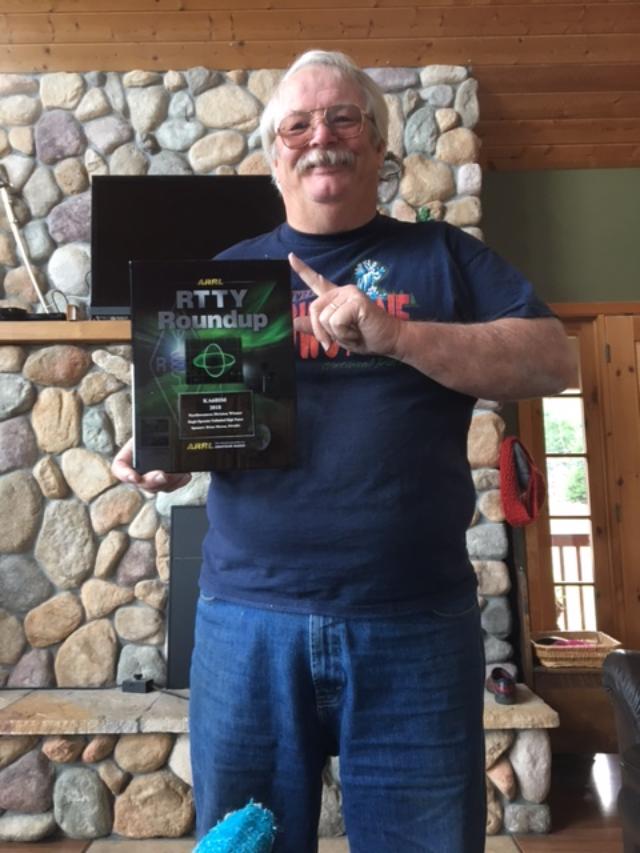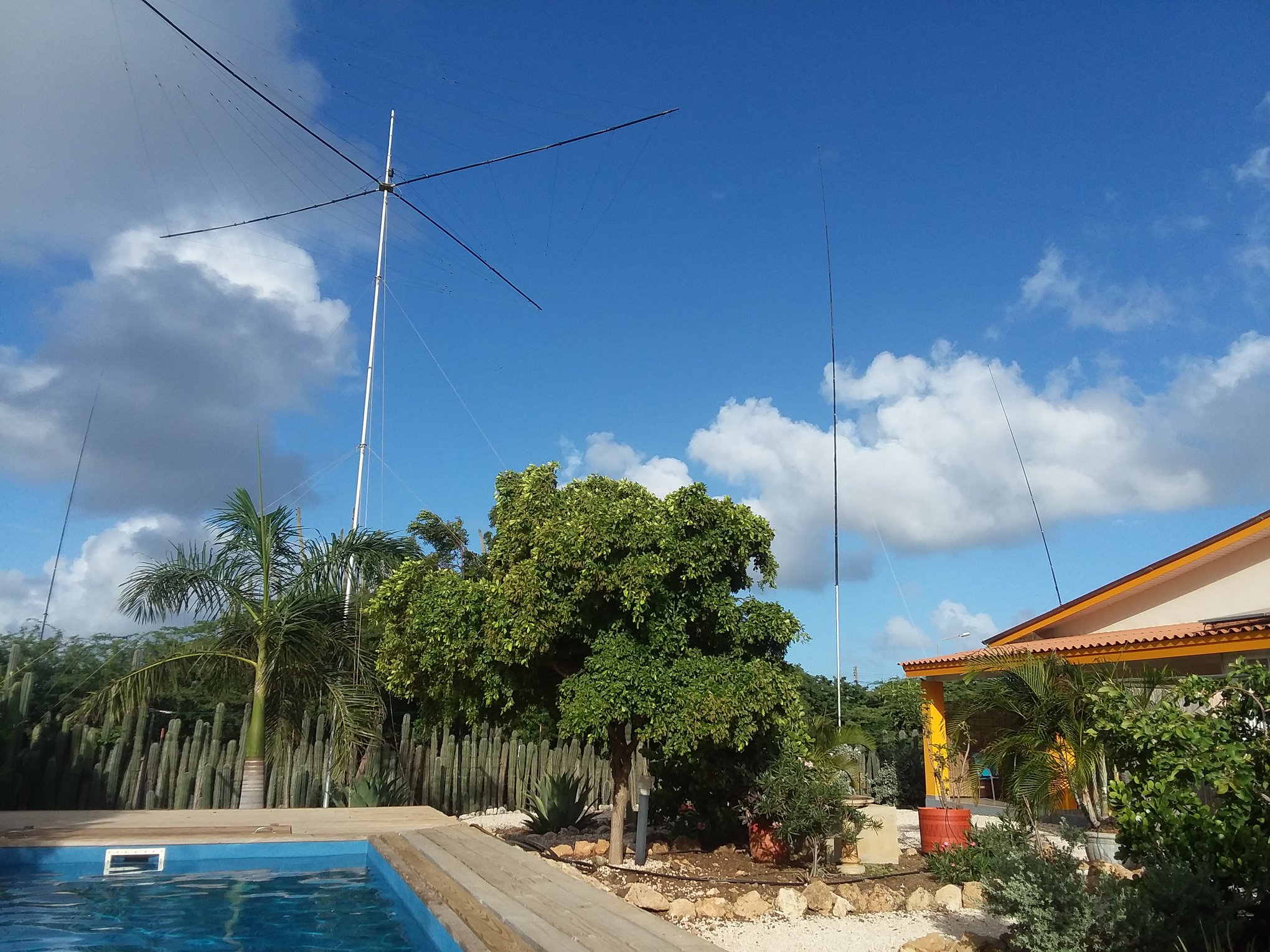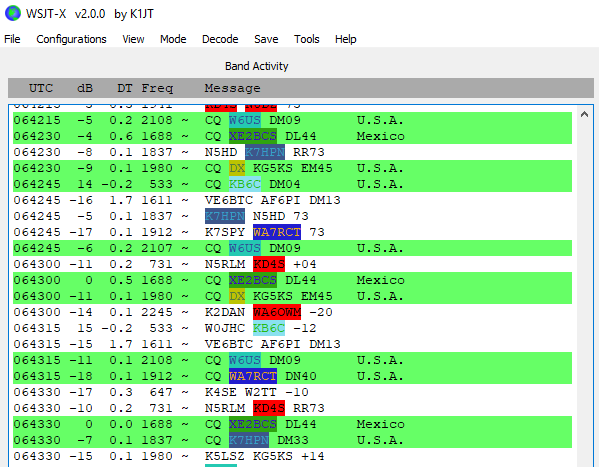 December 12, 2018 Editor: Paul Bourque, N1SFE | ||||
IN THIS ISSUE
There are many smaller and more casual operating events happening over the next few weeks, many revolving around the holiday season. Consider trying the ARRL Rookie Roundup, CW if you've been licensed for less than three years. The RAC Winter Contest on December 29 offers a lot of activity with the chance to use CW and/or Phone. There are plenty of categories to choose from to suit your operating style. Don't forget that you can use FT8 in the ARRL RTTY Roundup coming up January 5. See the website for more information. BUSTED QSOS The 10-meter RTTY Contest was NOT held this year, in lieu of the FT8 Roundup. I also busted K6AM's call sign. 13 Dec 2018 - 09 Jan 2019 Complete information for all contests follows the Conversation section December 13 December 14 December 15 December 16 December 17 December 19 December 20 December 21 December 23 December 26 December 27 December 28 December 29 December 31 January 1
January 2 January 3 January 4 January 5
January 6 January 7 January 8 The ARRL Contest Update will not be published on December 26. This issue shows contest schedules to January 9, 2019. See you in the New Year! WSJT-X users: Version 2.0 of WSJT-X has been released, and it's time to upgrade. See the WSJT-X website for the download links and upgrade information. If you are planning on using FT8 and WSJT-X in the ARRL RTTY Roundup, you will need to use version 2.0 of the software. The Mt. Airy VHF Society Packrats have some suggestions on how to use WSJT-X 2.0 in the January VHF Contest. They include:
Check out their December 2018 newsletter for all of the details, and more. John, AE5X, writes: "Your readers may be interested to know that there will be (in 2019) a Canadian version of 2016's ARRL NPOTA event." Canadian National Parks on the Air (CNPOTA) occurs during the calendar year of 2019. Rules are posted on the website. Ward, N0AX, writes: "If people have been hearing more E2 call signs on the air, it's partially due to the invigorated RAST team encouraging interest and activity. Lots of photos and notes on the RAST website. Enjoy!" (Ward, N0AX) Sure, the Stew Perry Top Band Distance Challenge is only for 160-meters, and a quarter wave on 160 meters is pretty long. Don't let that deter you from trying to get on for the contest! There's still time to build and use the K6MM "No Excuses" vertical antenna, or one of the many shown in "ON4UN's Low-Band DXing" book. It's traditional in this contest for plaques to be awarded for the use of unique antennas, overcoming difficult operating conditions, or the whim of the plaque sponsor. The first-even FT8 Roundup's Log deadline has passed. Just before that deadline, I asked Ed, W0YK, for his thoughts on the contest: "We have received 1235 logs so far. The official deadline is tonight. I think this confirms the instantaneous popularity of FT8 contesting. I think it also portends high FT8 activity in the ARRL RTTY Roundup in a few weeks. On the one hand I worry that activity will be dispersed across FT8 and RTTY, decreasing the potential activity in each mode since it is not a single mode contest. On the other hand, when the rate drops off in one mode, perhaps moving to the other mode will increase rate for some stations. We'll just have to see how it plays out. The log checking stats on the FT8 Roundup show a couple of significant differences compared to typical CW/SSB/RTTY stats. First, the number of busted call signs is much lower in the FT8 Roundup. I attribute that to the fact of the WSJT-X software doing low error-rate decoding with no human intervention. In contrast, though, the exchange (signal report and QTH/serial number) is about the same as other modes. I'm not sure how to rationalize that. Finally, the NIL rate is much higher in the FT8 Roundup and I attribute that to a lot of good QSOs not getting logged by WSJT-X. I observed that problem myself and heard it reported by others. It's something the developers need to improve as time goes on. Meanwhile, the FT8 operator needs to pay diligent attention to each QSO being logged." Steve, VE7SL, is active on 630-meters, where he finds that activity occurs mostly using JT9. He notes that signal levels were strong enough recently to support a CW contact between Larry, W7IUV, and Rolf, LA2XPA. He thinks that it's the first EU to western US CW contact. Chuck, NO5W, writes: "I've just released a new version of the Pile Up Practice application which includes a redesigned user interface and the addition of the Kansas City DX Club's 2018 Dayton Pileup Competition. If you've been to Dayton and discovered the KCDXC Hospitality Suite you know it's a very popular watering hole at the Crowne Plaza and a great place to meet and compete against many of the top CW contest operators just after the Contest Dinner and on into the night, usually closing around midnight after a hundred or so operators have competed. Not only is the suite a good place to meet and compete but you might also pick up a nice door prize or leading scorer prize if you are one of the top three. If you have not had a chance to attend then you can still test your skills against the attendees and see how you would have done against the leaders as well as the average attendee by using the Pile Up Practice application. It is also a good way to practice for a future competition if a trip to Dayton is in your plans. Currently, competitions going back as far as 1998 are available as well as the one held at WRTC 2014. Others will be added in the future. To obtain the application just follow the instructions on this page of my website. If you want to read more about the features and use of the application before doing the download there is a link on that page to a small document describing the application in detail. If you have questions feel free to contact me either at the CQ/X support address given on the web site or directly via my QRZ address." Filter Ripple For a band pass filter, the response across the filter's bandwidth should be as unvarying, or flat, as possible. The variation in the response is called 'ripple'. Ripple causes signal distortion and can adversely affect some digital modes even at low levels. Here's a different view of the contest pileup - YD3KNJ is using a straight key, QRP, and paper logging during the 2018 CQ World Wide CW contest. While camping. You'll recognize some US and DX contest calls on the other end in this YouTube video. (Dan, K7SS)
The recent ARRL 160-Meter Contest was negatively influenced by a major storm weather system in the middle of the US. Some participants noted that noise levels were elevated, masking any signals that might be present, and reducing their ability to work distant multipliers. Preliminary results from the 2018 ARRL 10 GHz & Up contest are now posted. Preliminary results for the 2018 ARRL November CW Sweepstakes and 2018 September VHF contests have also been posted. Comments from Dan, K7SS, operating in the ARRL 10-Meter Contest from Seattle: "Loud GA/LA opening. At least one op in California had a 190 hour into W8/W9, then poof!" From Bob, W7YAQ:"Sounded like the Florida QSO Party from here in Oregon." Results of the November 9, 2018 Frequency Measuring Test have been published. The results include the soapbox comments from participants, and a description of measurement techniques and equipment. With today's radios, reference-disciplined oscillators, and PC tools for FFT, some first-time participants obtained sub-Hz accuracy. Check out the results for ideas on new tools you can use, for example Spectrum Lab by DL4YHF. Raw scores for the FT8 Roundup have been posted. Log Checking Reports (LCRs) are available from Ed, W0YK, via email request. Raw scores for the recently completed CQ WW DX CW Contest can be found on the website. If you note discrepancies, there's a contact form to report them. (The Daily DX) The results from the 2018 SARTG WW RTTY 2018 Contest have been published. Rate versus Mode In a multi-mode contest, such as the ARRL RTTY Roundup and the January VHF Contest, be aware of when band conditions will support higher rates in a different mode. For example, if 15 meters is closed for RTTY, a zero rate, it might still be open enough to work five or ten stations in an hour on FT8. If conditions on 6-meters are good enough to support CW or SSB contacts, those modes would likely support higher hourly rates if enough stations are there to work. LibrePCB is an Open Source printed circuit board design software project, providing schematic capture, board layout, and component library functionality. The just-released version 0.1.0 runs on Unix/Linux, Mac OS X, and Microsoft Windows. This version can "download and create libraries, draw schematics, route multilayer PCBs and export Gerber files" but lacks support for "DRC, BOM export or buses." The authors invite people to try it with their projects; they are promising that improved future versions of the package will be compatible with designs created with today's software. The second Super VHF Conference is looking for your paper or presentation for their April 26 through -28, 2019, in Sterling, VA, near Washington, DC. This conference is jointly sponsored by the Mt. Airy VHF Society Packrats, New England Weak Signal Group, and Southeastern VHF Society, and hosted by the Grid Pirates Contest Group and Directive Systems and Engineering. "Presentations or papers are welcome on VHF, UHF, microwaves, and higher. All aspects welcome, technical and non-technical, including operating, contesting, homebrewing, roving, software, EME, surplus, antennas, test equipment, amplifiers, SDR, etc." See the website for more details. It started with interference on 80 meters. Some thought it was Over The Horizon (OTH) RADAR. But as Amateurs investigated, they used online SDR receivers to narrow the source to somewhere in ... Pennsylvania. (Tim, K3LR, via RFI mailing list) When you call CQ, you'd like to be rewarded with someone coming back to your call, and completed a contact. But you can't count on that happening every time. But when it does happen, it rewards the effort of calling CQ. The unpredictability of getting a positive outcome from calling CQ is like a form of variable-rate scheduling, a reinforcement technique used in psychology's operant conditioning, and related to why some humans enjoy games of chance.
With the release of WSJT-X 2.0, additional UDP packet types have been added in support of use with external applications. One new packet type provides the logged contact in ADIF format, while another type enables the highlighting of specific call signs within the WSJT-X band activity window.
Sweepstakes Multi Ops The preliminary results for the 2018 ARRL CW Sweepstakes are on the ARRL website, and Phone preliminary results won't be far behind. If you haven't tried multi-operator contesting, next year's Sweepstakes might be a good first try. One reason to do so might be that you want to hang out with friends for the Sweepstakes weekend, and you'd all like to operate, too. At minimum you'll need one radio, and you can divide up the operating however you'd like. If you want to be more serious, you could use a transceiver that has two VFOs, and you can 'pair contest' - one person runs the main VFO, and the other finds and lines up multipliers on the 2nd VFO. It can be another fun way to divide up operating. What I find fun about the category is the broad range of opportunity to combine operating technique and technology for bigger scores. Serious multi-ops can have multiple radios and multiple operators working simultaneously, with a lockout used to keep all but one radio from transmitting. There's a wide range of techniques for a lockout. It could be human, like using hand signals used to communicate radio use between operators. It could be electronic, with some dedicated hardware enforcing only one signal. N1MM Logger+ even has a lockout feature usable with multiple radios, provided that all CW messages, including fills are sent via the computer, and that all PTT for phone is run through the computer. Getting it working reliably is part of the fun, for me at least. Next year, I'm going to test the strategy of smaller transmit window times to see if that can more effectively interleave the phases of different QSOs on different bands, while not frustrating the operators too much. Of course, hearing the angry shouts of other operators as they wait for the 'lock' is also part of the multi-operator Sweepstakes tradition.
That's all for this time. Remember to send contesting related stories, book reviews, tips, techniques, press releases, errata, schematics, club information, pictures, stories, blog links, and predictions to contest-update@arrl.org 73, Brian N9ADG 13 Dec 2018 - 09 Jan 2019 An expanded, downloadable version of QST's Contest Corral is available as a PDF. Check the sponsor's Web site for information on operating time restrictions and other instructions. HF CONTESTS CWops Mini-CWT Test, Dec 12, 1300z to Dec 12, 1400z and, Dec 12, 1900z to Dec 12, 2000z and, Dec 13, 0300z to Dec 13, 0400z; CW; Bands: 160, 80, 40, 20, 15, 10m; Member: Name + Member No., non-Member: Name + (state/province/country); Logs due: December 15. CWops Mini-CWT Test, Dec 26, 1300z to Dec 26, 1400z and, Dec 26, 1900z to Dec 26, 2000z and, Dec 27, 0300z to Dec 27, 0400z; CW; Bands: 160, 80, 40, 20, 15, 10m; Member: Name + Member No., non-Member: Name + (state/province/country); Logs due: December 29. VHF+ CONTESTS AGCW VHF/UHF Contest, Jan 1, 1400z to Jan 1, 1700z (144) and, Jan 1, 1700z to Jan 1, 1800z (432); CW; Bands: 144 MHz, 432 MHz; RST + "/" + Serial No. + "/" Power class + "/" + 6-character grid locator; Logs due: January 2. 13 Dec 2018 - 09 Jan 2019 December 13, 2018 December 14, 2018 December 15, 2018 December 16, 2018
December 17, 2018 December 19, 2018 December 20, 2018 December 21, 2018 December 22, 2018 December 23, 2018
December 24, 2018 December 25, 2018 December 28, 2018 December 29, 2018 December 30, 2018 December 31, 2018 January 1, 2019 January 2, 2019 January 3, 2019 January 4, 2019 January 5, 2019 January 6, 2019 January 7, 2019 January 8, 2019 January 8, 2019 January 9, 2019 ARRL Information Click here to advertise in this newsletter, space subject to availability. Your One-Stop Resource for Amateur Radio News and Information ARRL membership includes QST, Amateur Radio's most popular and informative journal, delivered to your mailbox each month. Subscribe to NCJ - the National Contest Journal. Published bimonthly, features articles by top contesters, letters, hints, statistics, scores, NA Sprint and QSO Parties. Subscribe to QEX - A Forum for Communications Experimenters. Published bimonthly, features technical articles, construction projects, columns and other items of interest to radio amateurs and communications professionals. Free of charge to ARRL members: Subscribe to The ARRL Letter (weekly digest of news and information), the ARES E-Letter (monthly public service and emergency communications news), Division and Section news -- and much more! ARRL offers a wide array of products to enhance your enjoyment of Amateur Radio. Visit the site often for new publications, specials and sales. Donate to the fund of your choice -- support programs not funded by member dues! Reprint permission can be obtained by sending email to permission@arrl.org with a description of the material and the reprint publication. ACKNOWLEDGEMENTS ARRL Contest Update wishes to acknowledge information from WA7BNM's Contest Calendar and SM3CER's Contest Calendar. | ||||









